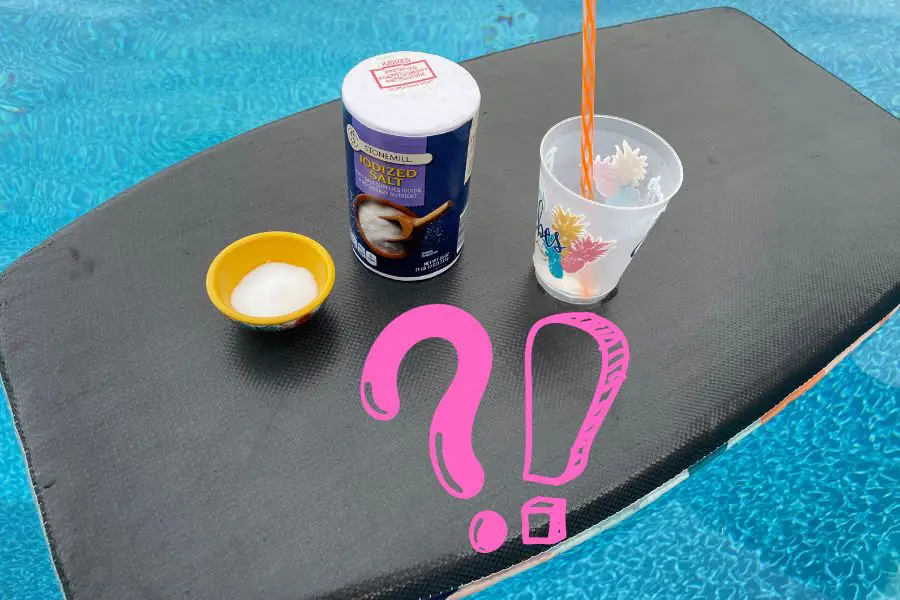Although it’s not recommended that you drink pool water, it will inevitably splash into your mouth as you’re swimming about. In many cases, the pool water may have a slightly bitter taste due to the sanitants that keep the water safe. But, what if your pool water tastes salty?
Similar to how pool water may look clear but feels slimy, there’s typically an underlying cause as to why it may look OK but tastes salty.
There are several reasons why pool water can be salty, including the type of chlorine used, high TDS levels, or adding unnecessary pool salt. Pool owners must closely monitor the pH and chemical levels to ensure the water is safe (and tastes okay!) for their swimmers.
In this article, we’ll walk you through the reasons why your pool water tastes salty and whether it is actually bad. Let’s begin!
Why Pool Water Tastes Salty
Summer is upon us, and you’re getting your swimsuit ready for a dive in the pool. But there seems to be something…salty about it? Let’s take a look at some possible causes of this problem.
1 – High TDS Levels
TDS stands for Total Dissolved Solids. It’s a measurement used for drinking water in general or swimming pool waters.
It basically refers to everything dissolved in your pool water that isn’t water, including minerals, organics, salts, and all microscopic elements that are in the swimming pool water as a result of the chemical additives, water treatments, or regular usage.
The levels of the TDS also affect water clarity and chemical efficiency. Changes in the water flavor (such as salty or bitter) are the most noticeable factor if your TDS levels are high.
High TDS levels can also result in:
- A drop in the filtering and pumping equipment efficiency.
- Wear and tear on pool fixtures.
- Crust and scaling around the pool.
If left untreated, high TDS levels can pose a major problem.
Usually, a freshwater pool has a TDS value that’s no more than 1,500 ppm (parts per million) above the TDS of tap water. This might require you to test the tap water first to calculate the difference.
Tap water’s TDS level is usually around 500 ppm. Ideally, TDS levels in freshwater pools should be around 1,500 and 2,000 ppm.
2 – It’s a Saltwater Pool
Another possible reason the pool water tastes salty is that it may be a saltwater pool rather than a chlorine-based one!
In saltwater pools, salt is converted into chlorine by a saltwater chlorine generator (SWCG). Rather than manually adding chlorine to the pool, the saltwater generator creates chlorine from the salt itself.
As with conventional pool chlorine, converted chlorine kills bacteria and algae, and oxidizes dirt and chloramines.
Because saltwater pools use a salt generator, they require 3,000 to 3,500 ppm of salt. So, the recommended limit of TDS simply goes out the window, and the salt levels go up!
However, saltwater pools aren’t generally too salty. In comparison to ocean waters, saltwater pools are 10 times less salty. But when you’re comparing it to a freshwater pool, that’s where the issue of taste might arise.
3 – It Was a Saltwater Pool
As discussed above, a saltwater pool entails adding salt to the pool water. If you notice that the pool’s water tastes salty, even though it’s a chlorine pool, it may have originally been a saltwater pool.
The main issue people face switching from saltwater pools to chlorine one is getting the salt out as much as they can.
Once salt is added to the pool it cannot be removed without draining. For this reason, it’s recommended to drain and refill the pool to remove salt remnants.
However, it’s not recommended to simply dump the water into your yard. It’s potentially harmful to the ecosystem to drain saltwater pools like that, as salt breaks down into various components that may harm the environment.
To remove the water, a proper drainage location needs to be determined with your local jurisdiction.
Alternatively, a truck can be brought in to remove the water. As you can imagine, this can be an expensive proposition.
Regardless of how the pool is converted, there may be some salt residue remaining, causing the salty flavor.
4 – Unnecessary Salt Addition
Sometimes, people will add salt to their chlorine-based pools. The main reason for this is that one of the benefits of saltwater pools is a gentler feel on the skin and less irritation.
However, as we’ve mentioned before, saltwater pools require salt generators to turn the added salt into chlorine. Though people still do this to improve their swimming experience, monitoring the chemical levels is vital for a good swimming experience.
Moreover, they could be adding salt to an actual saltwater pool. You might think this is alright because that’s what’s supposed to happen. Nonetheless, adding extra salt without reading the system requirement for the amount of salt can cause the generator to not function properly.
Also, some generators have some requirements as far as salt concentration and frequency of application. If you add salt to your pool without taking into consideration the other elements required, you may end up with a saltier-tasting pool than you intended.
Is Chlorine Salty?
Chlorine is generally known to taste bitter or metallic-like. After all, it’s a disinfectant product used on or in most items to kill any bacterial growth and germs. If your pool’s chemical levels are balanced, you’re unlikely to experience a salty or metallic taste.
However, if you’re not keeping an eye out for the Langelier Saturation Index (LSI), you might end up with high chlorine levels messing with your pool’s pH balance. This can result in all types of unwanted water flavors, saltiness being on top of the list.
If you’re certain it’s not a saltwater pool and no salt has been added to the water, then it may be because of salts introduced via chlorine. As chlorine breaks down it results in chlorides, which is a component of salt.
Sodium Hypochlorite (Bleach) is often used as a liquid chlorine product. As the name implies, it contains sodium, a.k.a. salt. Liquid chlorine often results in higher concentration of salt than chlorine tablets.
If you add liquid chlorine to your pool every week, you may be adding about 17 ppm of salt per gallon. It may not seem like much, but it can quickly add up over time if you don’t find a way to neutralize the salt levels.
If you’re using chlorine tablets composed of Calcium Hypochlorite, you’ll only be adding about half as much salt as the liquid chlorine.
When the salt levels in your water reach around 3,500 ppm, you’ll probably start to taste salt. As previously mentioned, salt must be removed through draining or diluting with fresh water.
Fortunately, most outdoor pools require periodic addition of water which should help dilute any salt build up.
Is Too Much Salt in Your Pool Bad?
While the salty taste of pool water is not necessarily bad, problems can arise due to a high level of salt.
For instance, high salt concentrations can lead to corrosion of metallic pool components. This includes ladders, rails, pump and filtration system. Chlorides above 2000 ppm may eventually lead to failure of even 316 stainless steel pool components.
Additionally, if you have a saltwater pool, high salt concentrations may cause your SWCG to stop working. This means it’s important to understand the capacity of your SWCG to ensure you don’t exceed its limits.
How to Know If Your Pool Contains Too Much Salt?
There’s only one way to be sure whether or not your pool has a large quantity of salt, and this is to test its salinity levels.
Most pool test kits can be used in salt and freshwater pools. However, not all of them check the salt levels. Get a proper pool salt test kit and inspect the salinity levels yourself.
Saltwater pools usually have salt levels between 3,000 and 3,500 ppm. If your pool has salt levels above the 2000 ppm mark, chances are it has been treated with salt or has excess salt build up due to chlorine.
Compare your test results with the aforementioned numbers to figure out your next move. Testing your pool water regularly will help you keep an eye on the TDS levels so that you know if they’re getting too high.
Final Takeaway
Finding out why your pool water tastes salty greatly depends on the amount of time and money you’re willing to put into testing and monitoring the chemical levels.
Since you shouldn’t actually be drinking the pool water, it may be somewhat trivial to investigate the salty taste of your pool. However, if it’s due to high TDS in your pool, it may be worth taking appropriate steps to lower the level back down.
Hopefully, with the aid of the information shared in this post, you can figure out which one is causing the issue and address it with ease.
Just know that if you’re pool water isn’t salty, but has other off-putting flavor then there may be other causes to investigate.
Happy Swimming!
Husband and father of three (actually, four if you include the pool). I’m an avid DIY-er and weekend warrior that enjoys taking up new projects around the house to help us maximize leisure right at home. I enjoy researching and sharing various tips, tricks and knowledge to help others make their home an oasis.

